- Home
- Molly Harper
Rhythm and Bluegrass Page 7
Rhythm and Bluegrass Read online
Page 7
“No, no, don’t do that,” he said as I opened it to see a picture of Will and his dad behind the hamburger counter, wearing matching white paper hats. Will and his dad eating pie with a much younger Loretta Lynn. Will’s mother chasing a pair of possums while Will laughed hysterically. What looked like a baby Will sitting in James Brown’s lap.
I cried, “These are great!”
He groaned. “I only kept them to make my mom happy. She likes to think of the good times.”
“But these pictures are adorable,” I cooed. “Look at you, wiping lemon meringue pie filling on Loretta Lynn’s skirt.”
“She was not happy about that,” he said, shaking his head.
“Come on, you have to admit there were perks to growing up here. How many people can say that they sat on the laps of music legends?”
He sighed. “It’s like my life is divided into two sections. The part when I was a kid, and everything about the hall was excitin’ and I was meetin’ all of these fun people in sparkly clothes. And when my dad said everything was gonna be okay, I believed him. And then there’s another part, when I knew better. It’s less fun, less colorful now, but I know where I stand.”
“Maybe it’s not about knowing where you stand. Maybe it’s about remembering those good times without resenting what caused them.”
“You have a Hallmark greeting card speech for just about every situation, don’t you?” he muttered.
I nodded. “Except for ‘your husband dumped you for a lady lumberjack,’” I told him. “There are no words that will make that better.”
“You are . . . different, aren’t you?” he asked, staring at me. I shrugged. “Why are you so interested in this stuff? I mean, you don’t have any connection to the musicians. You don’t know anybody in Mud Creek. Why is this so important to you?”
“Those who don’t respect history are doomed to repeat it,” I told him.
“Well, that was clichéd and condescendin’.”
I sighed. “My parents, they edited history at will. No, it wasn’t my dad’s fault we had to move to a different post. It wasn’t because he’d alienated everybody he worked with. He just wanted a change of scenery. And Mom didn’t start a fight with my grandparents that ruined Thanksgiving. She just wasn’t feeling well, that’s all, and we had to leave early. Stories got edited to make them look better, and you looked like the selfish one. And they changed more every time they were told. If you tried to argue with my parents, they were just so insistent that that was the way it was, they were so resolute, that you felt like you were the crazy one for remembering it differently. I grew up unsure of a lot of things. So having facts and concrete proof of the past, it’s reassuring. It makes me happy to preserve that, to give that gift to other people. And I’ve always had a soft spot for country music, and rhythm and blues. Sure, it’s usually about pain and heartbreak, but at least it’s honest.”
“Yeah, but aren’t most perspectives on history skewed? I mean, dependin’ on who writes the story, that’s the point of view you’re gonna get, right?”
My jaw dropped. “Why would you say that?” I exclaimed.
“Because you’re awfully cute when you get mad.”
I glared at him. Clearly I wasn’t going about this in the right way. I needed to find some way for him to feel involved in the restoration without feeling threatened. Men like Will needed to feel useful. I glanced over his shoulder to see that his mother was still searching the walls. My gaze fell on the defunct jukebox in the corner. “While you’re here, can you give me a hand with this? I’m shipping it to a restorer tomorrow, but they asked me to have it strapped to the handcart when they pick it up. Something about liability.”
“Fine.” He sighed. “I can’t deal with ya when you’re lookin’ up at me with those freakishly large eyes. It’s like being sexually harassed by an anime character.”
“I’m wondering how much anime you’ve seen.”
“Where are your lift belts?”
“In the office.” I pointed toward the hamburger counter.
He went to rummage among my packing supplies while I gingerly pulled the jukebox away from the wall, bracing myself for any little shapes that could dart out between my feet at any moment. While I could scoot the heavy metal box across the smooth wooden floor, I wasn’t going to be able to lift it onto the rolling cart.
I peered down at the perfectly rectangular dust spot the jukebox had left behind. There were the expected dust bunnies, loose quarters going as far back as 1943, and an old tube of Maybelline lipstick that had long since turned to red chalk. I carefully shoved the ancient machine farther away from the wall and heard a brittle rustling noise. I froze, waiting for the mouse or rat or—God forbid—another possum to run out of the nest I’d just disturbed. But nothing came a-nipping at my ankles.
I reached under the machine and my fingers brushed against a thin sheaf of paper caught in its frame. I carefully drew the old lined notebook paper out, blowing the thick layer of dust away. I could just make out the faded blue ink chicken-scratched across the note.
Unfolding the bundle, I found that it was actually four pages. One was a carefully penned letter to “Louis” from “E.”
“Dear Louis, I know this is going to hurt you,” I read aloud. “I hate the idea that you’re going to show up tonight, expecting me to meet you, when I’m not going to be there. I can’t leave my mama, Louis. I just can’t. She’s too sick to take care of herself, much less my brother. If I leave, everything falls apart. I love you. I will always love you. But this just isn’t the right time. Maybe in a few years, if you still feel the same way about me, you’ll come back and we’ll find each other all over again. If not, I hope you find someone to love you the way you deserve, the way I love you. With all of my heart, E.”
I glanced up at the framed photo of Louis Gray on the wall. Could he be the Louis the letter was addressed to? Even if he wasn’t, this sort of Dear John letter would be an interesting artifact to display. I could do some sort of “Broken Hearts” exhibit to honor country music.
Wincing at the stress I was putting on the old paper, I pulled the next two pages away. The creases were soft with age, the fibers of the paper fanning out like little palm fronds. The block script was uneven and choppy, as if the author had used a wall or someone’s back as an improvised writing desk. The ink was smudged in places, where water had dropped onto the words and then dried. Was this an honest-to-goodness tearstained letter?
It would be wrong to call the Broken Hearts display “Tears in Their Beer,” wouldn’t it? I chewed my lip. Probably. McBride’s hadn’t even served beer.
These pages looked more like poetry, blocks of verse with words scribbled out and revised. “Missing you, lady, like the air I breathe,” I murmured, reading it aloud. “Missing you, lady, and I can’t believe, That you lost your love for me. That you lost your faith in me. You’re gone. You’re gone. My love—”
I looked up to see Will emerge from my office with some lift belts. “Why do you have that incredibly frightenin’ smile on your face?” he asked.
“This is a happy face.”
He chuckled. “That’s why it’s frightenin’. You look like a demented tooth fairy.”
“You’re afraid of the tooth fairy?”
“You have your issues, I have mine. What is that?” he asked, nodding toward the yellowed paper.
“You ever heard that song ‘Lurlene, Lurlene’?” I asked carefully.
He shrugged. “Who hasn’t?”
“Well, I am pretty sure that this is an early—if not original—draft of the lyrics.”
“What? That’s not possible,” Will scoffed as I gingerly placed the sheets in his hands.
“No, look, he’d crossed out ‘baby’ and written ‘lady.’ And then he wrote ‘baby’ again,” I said, unearthing a rectangular Tupperware box from my kit. I took the pap
ers from him and tucked them inside.
“You’re puttin’ it in Tupperware?” he asked.
“Until I can figure out the best way to flatten it, smooth out the wrinkles, and store it in an acid-free sleeve,” I told him. “I’ll have to verify with my handwriting guy, but this could be a centerpiece exhibit. Museum directors from all around the country would line up for the chance to display it, even temporarily.”
“You have a handwritin’ guy?”
“Yeah, in Chicago. Who doesn’t?”
Will kissed my forehead. “Gosh, you’re cute.”
I rolled my eyes at him. “Look, this is like having the first few lines of ‘Blue Suede Shoes’ scribbled on a cocktail napkin from Maggie’s Short Orders.” Will gave me a blank look. “The original name for Gus’s World Famous Fried Chicken in Memphis?” More blankness. “We really need to get you outside the town limits every once in a while.
“Just think about it,” I continued, gesturing to the room. “Louis sat here, maybe at this very table, pining for his lost Lurlene. Imagine what sort of woman she had to be to catch his attention. And it hurt so much, he gave up and tossed the paper at the wall and it fell behind the jukebox.”
He clapped his hands over his face. “Oh my God, please save me from the rabid romantic goo in those big ol’ blue eyes of yours.”
“There’s nothing wrong with being exposed to actual human emotions beyond ‘I’m horny’ and ‘I want a sandwich.’”
“That’s not fair. I occasionally want a beer, too,” he told me.
I may or may not have clutched the Tupperware to my chest like a beloved teddy bear. “I can’t believe this was still under there after so many years.”
Will grimaced, looking around the room to places where I’d sorted various junk into “keep” and “trash” piles. “Well, Dad was never much of a housekeeper.”
7
In Which I Seek Shelter from the Storm
I sat in the FrankenBug, parked outside the Mud Creek post office, staring at the forms I had balanced against the steering wheel. I’d practically chewed a hole in my lip weighing the various consequences of signing this paperwork. That very morning, my handwriting guy had faxed me an “absolutely, positively yes,” to confirm that the lyrics matched known samples of Louis Gray’s handwriting. He’d turned his opinion over far more quickly than I’d anticipated. I thought I would have time to mull this decision over. But here I was, less than a week later, staring at the proposal forms that would nominate McBride’s Music Hall as a national historic landmark. I had a friend in the National Park Service who believed she could fast-track the review process through initial inquiry and submission steps, since the site was being considered for demolition.
Preventing said demolition would, to put it mildly, complicate Will’s plans to build a factory there. He would not be happy, nor would the dozens of people who hoped to get jobs at the factory. But I believed I was doing the right thing. At least, that’s what I kept telling myself every time my hand trembled its way out of signing the proposal form.
Simply put, McBride’s was too precious to bulldoze. Rock and roll, blues, country music—they were among America’s few completely original contributions to world culture. McBride’s provided a window into our musical heritage that was disappearing quickly under the rubble of iPods and YouTube music videos. The fact that Louis Gray had written one of the seminal blues songs inside its walls just gave me the right hook to convince the landmark review committee of my position. Tearing it down would be like finding the desk on which Thomas Jefferson drafted the Declaration of Independence and trashing it in favor of something you bought at IKEA.
It had to be protected, preserved for future generations to enjoy. I’d been right before; the music hall would make a perfect music museum. Almost everything I needed was already there. I just had to polish it up a bit (okay, a lot) and organize the debris into exhibits. And I already had the centerpiece artifact. Displaying the draft lyrics to “Lurlene, Lurlene” would make the McBride’s museum more than just a roadside attraction. It would become a mecca for music fans, like Elvis’s birthplace or Jim Morrison’s grave. People whose broken hearts had been mended by Louis Gray’s music would flock to the place where he’d felt the same pain and put it into words.
And I could help tell the story. I could do my part to protect that little piece of history. I couldn’t let an opportunity like this just slip through my fingers.
I took a deep breath, propped my hand against the steering wheel, and signed the proposal. I sealed it in the manila envelope, checked that I had the appropriate postage attached, and dropped it in the big blue mailbox.
No turning back now.
Three days later, I sat at my kitchenette table, unable to sleep, poring over lists and plans and Post-it “to dos” before I was ready to pitch my idea for a McBride’s museum to Sadie. Technically I didn’t need her approval to launch the idea and start recruiting sponsors, but to go around her would just be rude.
Besides, it wasn’t as if I could sleep. Here’s the thing about trying to sleep in a metal trailer—it amplifies every noise within a five-mile radius. And at the moment, the wind and rain were battering the sides of my trailer like an army of pissed-off tap dancers. I was living in a giant tin can phone strung up to the entire trailer park.
I tried to find the muffled noise “soothing.” But the thunder came closer and closer until it sounded like it was hammering my door down. Wait. That was my door. I bolted up from the table, batting at the Post-its stuck to my cheeks. Apparently, I’d fallen asleep.
And someone was beating on my door. Blinking and wiping at my eyes, I grabbed my trusty can of decoupage sealant and approached the rattling metal frame. I looked through the peephole and saw Will standing there in a bright yellow rain slicker marked MCVFD.
I yanked the door open and ever-so-subtly tried to move in front of my kitchenette table.
Evidence of a guilty conscience, a little voice singsonged in my head.
Shut up, singsong internal voice!
“Hi!” I said, just a little too loudly. “What are you doing here?”
Windblown and wet, Will looked down at my pajama pants and frowned. Well, if he wanted me to answer the door in something sexier than butterfly-patterned purple cotton pants, he should give me some warning.
“Hey!” he yelled over the howling rain. “Haven’t you been watchin’ the weather reports?”
“I don’t have a TV!”
Behind him, the wind beat the trees into submission, stripping away leaves as the limbs flailed around like temperamental toddlers. I stood, mesmerized by the inky black soup of clouds rolling overhead, lashing us both with sheets of rain. Shoving past me, Will picked up a pair of rain boots and a jacket I’d slung over my wall-mounted couch and threw them at me. “Put these on. Hurry!”
“What are you doing?” I yelled.
“Severe thunderstorms. Tornado warning! Winds reaching up to eighty miles per hour!” he shouted, yanking my arm as I slipped into my boots. “Everybody in the trailer park is going to the shelter.”
“What shelter?” I yelled. “Wait, which is worse, a tornado watch or a warning? I always forget!”
“Would you please just come on, woman?” he yelled, picking me up like I weighed nothing and throwing me over his shoulder caveman-style.
“Wait!” I snagged my purse and laptop bag as he carried me out through the doorway. Of course, he turned around to secure my door and whacked my head against the metal door frame. “Ow!” I yelped.
“We have to move!” And with that, he carried me out into the slashing rain. All of the other trailers were dark, abandoned, but they were rocking back and forth like something out of a dirty trucker joke. I got soaked in just a few moments, my pajama pants clinging to my legs like a second skin. Will’s body heat radiated through his jacket to my stomach as he
jogged past the other trailers to a green plastic bulkhead set into what the Fernwood residents loosely called a courtyard. He set me on my feet and led me down a set of steps lit with LED camping lanterns. My head felt funny, itchy at the temple where Will had bumped it against the door.
“Fred!” he yelled. “Is that everybody?”
“Yeah!” Fred shouted over the howling wind. Will nodded and slid a bolt across the hard plastic door, locking us in. The sudden vacuum of quiet was shocking.
“Everybody okay down here?” Will asked, turning his back on me to address the group of guys hovering at the bottom of the stairs, listening to the wind while a weather radio played in the background. I shivered without his body heat and found myself wanting to snake my way under his arm to get that warmth back. My neighbors grumbled their assent and made way for me when I moved toward the relatively open ten-by-twelve-foot space lined in hard green plastic. I felt like I was standing in the world’s largest Girl Scout canteen. Glancing around, I saw Ina Jane, Lula, and Rosalee huddled against the walls with their husbands and children. The kids, still in their pajamas, were wrapped in sleeping bags and blankies, rubbing at their eyes as if they didn’t understand why their parents had dragged them out of bed and into the rain.
“What is this?” I demanded just as a weather radio’s automated voice stated, “If you can hear this message, you are strongly advised to seek shelter immediately . . .”
Now he tells me. Stupid unhelpful robot.
“This is a storm shelter,” Will said, motioning to the kids to scootch together and make room for others. “One of those prefab deals. Miss Martha, your landlord, had it installed a few years ago after a tornado took out some trailers.”
“Don’t you usually have a siren that warns people when the weather is getting this bad?” I asked, swiping at my temple.

 Better Homes and Hauntings
Better Homes and Hauntings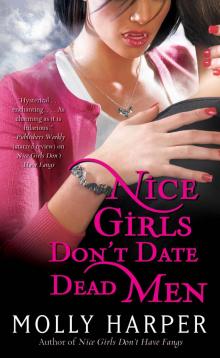 Nice Girls Dont Date Dead Men
Nice Girls Dont Date Dead Men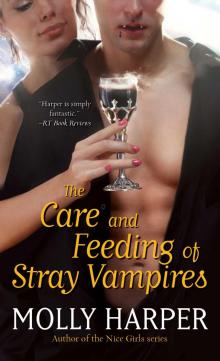 The Care and Feeding of Stray Vampires
The Care and Feeding of Stray Vampires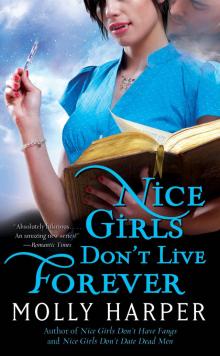 Nice Girls Dont Live Forever
Nice Girls Dont Live Forever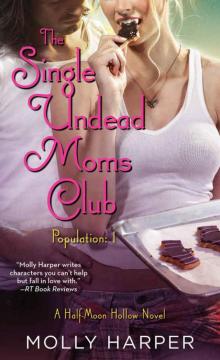 The Single Undead Moms Club
The Single Undead Moms Club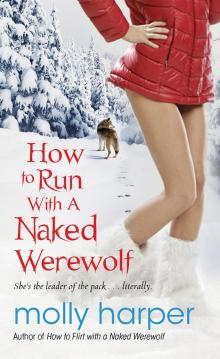 How to Run with a Naked Werewolf
How to Run with a Naked Werewolf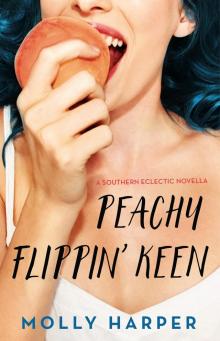 Peachy Flippin' Keen
Peachy Flippin' Keen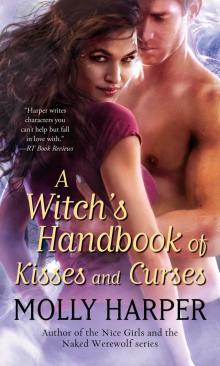 A Witchs Handbook of Kisses and Curses
A Witchs Handbook of Kisses and Curses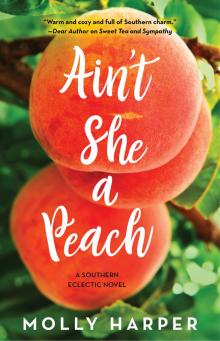 Ain't She a Peach?
Ain't She a Peach?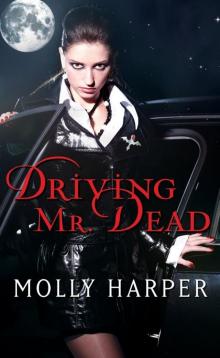 Driving Mr. Dead
Driving Mr. Dead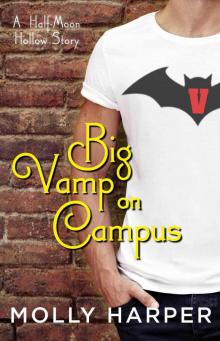 Big Vamp on Campus
Big Vamp on Campus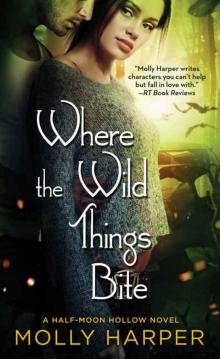 Where the Wild Things Bite
Where the Wild Things Bite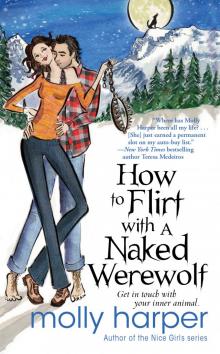 How to Flirt with a Naked Werewolf
How to Flirt with a Naked Werewolf Nice Girls Don’t Sign a Lease Without a Wedding Ring
Nice Girls Don’t Sign a Lease Without a Wedding Ring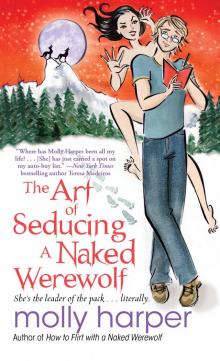 The Art of Seducing a Naked Werewolf
The Art of Seducing a Naked Werewolf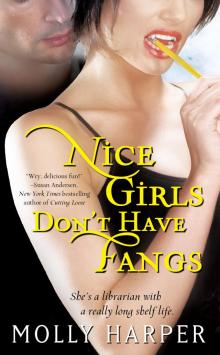 Nice Girls Dont Have Fangs
Nice Girls Dont Have Fangs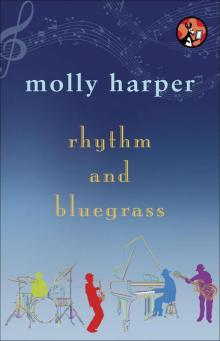 Rhythm and Bluegrass
Rhythm and Bluegrass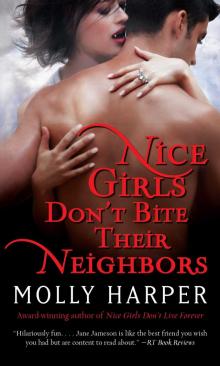 Nice Girls Dont Bite Their Neighbors
Nice Girls Dont Bite Their Neighbors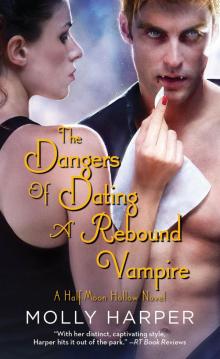 The Dangers of Dating a Rebound Vampire
The Dangers of Dating a Rebound Vampire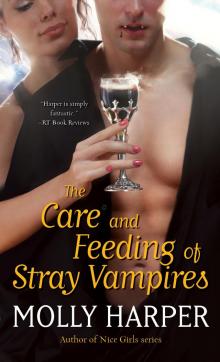 Undead Sublet
Undead Sublet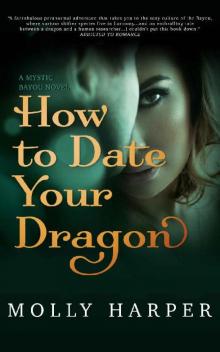 How to Date Your Dragon
How to Date Your Dragon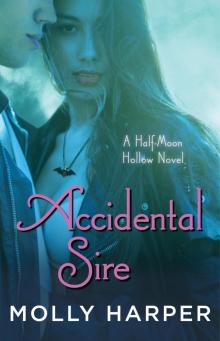 Accidental Sire
Accidental Sire I'm Dreaming of an Undead Christmas
I'm Dreaming of an Undead Christmas Peace, Blood, and Understanding
Peace, Blood, and Understanding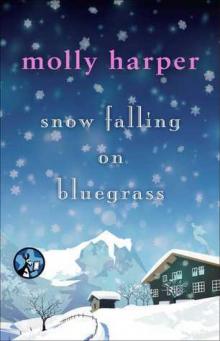 Snow Falling on Bluegrass
Snow Falling on Bluegrass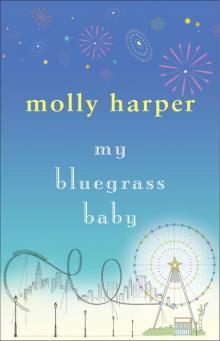 My Bluegrass Baby
My Bluegrass Baby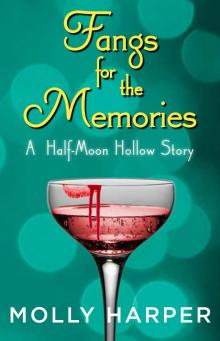 Fangs for the Memories
Fangs for the Memories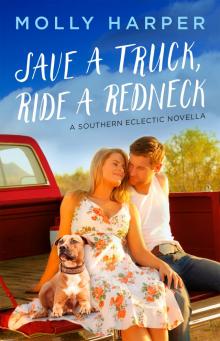 Save a Truck, Ride a Redneck
Save a Truck, Ride a Redneck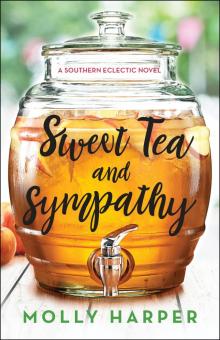 Sweet Tea and Sympathy
Sweet Tea and Sympathy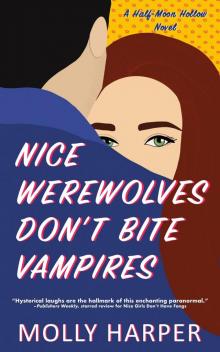 Nice Werewolves Don't Bite Vampires
Nice Werewolves Don't Bite Vampires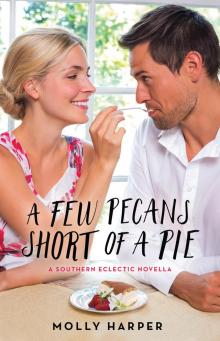 A Few Pecans Short of a Pie
A Few Pecans Short of a Pie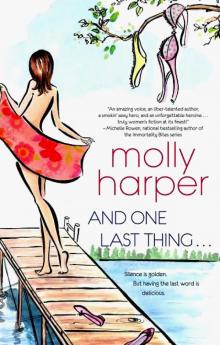 And One Last Thing ...
And One Last Thing ...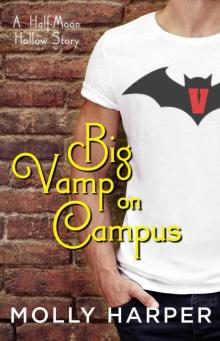 Big Vamp on Campus (Half-Moon Hollow Series Book 7)
Big Vamp on Campus (Half-Moon Hollow Series Book 7)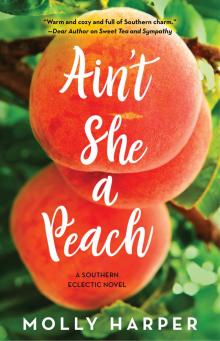 Ain't She a Peach
Ain't She a Peach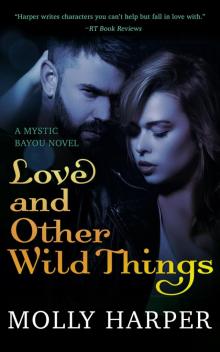 Love and Other Wild Things
Love and Other Wild Things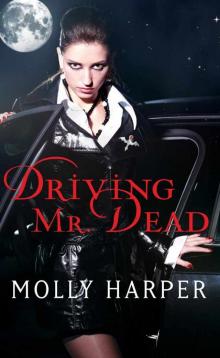 Driving Mr. Dead
Driving Mr. Dead![[Jane Jameson 03.5] Nice Girls Don't Sign A Lease Without A Wedding Ring Read online](http://i1.bookreadfree.com/i1/04/06/jane_jameson_03_5_nice_girls_dont_sign_a_lease_without_a_wedding_ring_preview.jpg) [Jane Jameson 03.5] Nice Girls Don't Sign A Lease Without A Wedding Ring
[Jane Jameson 03.5] Nice Girls Don't Sign A Lease Without A Wedding Ring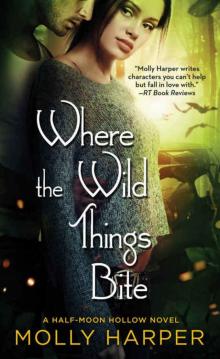 Where the Wild Things Bite (Half-Moon Hollow #8)
Where the Wild Things Bite (Half-Moon Hollow #8)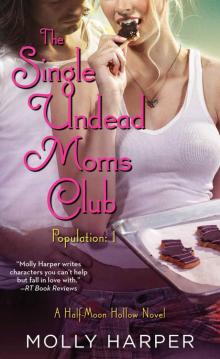 The Single Undead Moms Club (Half Moon Hollow series Book 4)
The Single Undead Moms Club (Half Moon Hollow series Book 4)